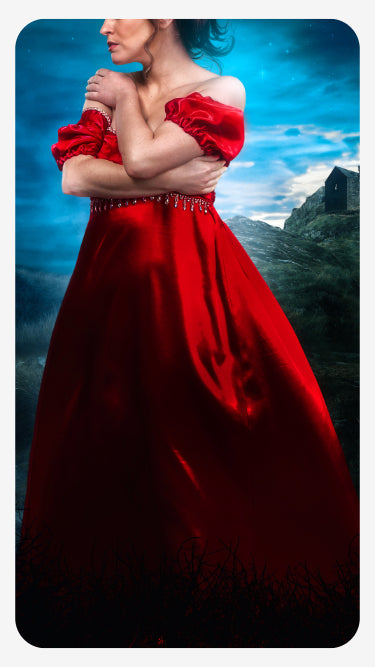The Darnaly Castle Series Books 2-4 (Paperback)
The Darnaly Castle Series Books 2-4 (Paperback)
Continue the adventure...
Couldn't load pickup availability
- Best price | Lower than any other retailer
- Delivered in 7-14 days
 Satisfaction guaranteed
Satisfaction guaranteed
Book Synopses
Book Synopses
BOOK TWO: SWEPT INTO THE STORM
Mexico 1824
Ever since he unexpectedly inherited an earldom in the Scottish Highlands, Cameron Dunn’s been searching for something, anything, to bring meaning to his new life—a search that reaches an abrupt end when he’s washed up, alone, on a deserted beach in Mexico.
Or at least the beach should be deserted. There’s no village for hundreds of miles. So who’s that beautiful woman walking toward him over the sand?
Letty Monro has a business to run, a plan for her future. Rescuing a shipwrecked earl wasn’t on the agenda. But the man’s desperate, so of course she’ll bring him to the British Settlement—for a price.
“So good I needed to take a reading break for a couple of days so I could put the pieces of my heart back together.” - Amazon reviewer
”You guys....I think I found me a historical romance auto-buy author!!” - Instagram reviewer
Keep reading ‘Swept Into the Storm’ if you like…
- Forced proximity
- Class difference
- Tropical settings
- Diverse characters
- Grumpy/sunshine (She’s the grump)
BOOK THREE: A RADICAL AFFAIR
Scotland 1824
Cybil Bythesea is imprisoned in a marriage that ended ten years ago. That’s when she fled the cruelty of her husband and took refuge at her father’s estate. Since then, her family’s money has kept the villain at bay, and she’s been able to pursue her creative passion—writing. But freedom, true freedom, has been beyond her grasp.
Except for her clandestine liaisons with Will.
Will Chisolm is haunted by the past, the tragedy of his family’s eviction, then his own foolish descent into political radicalism. Even now that he’s gained wealth and respectability in Glasgow, he’s burdened with more responsibility and guilt than anyone knows.
But there’s something about Cybil—a lightness, a kinship that, at least temporarily, makes all Will’s troubles fade away. It’s a dangerous game. Cybil is his employer’s sister, the wife of his political enemy and for the last four years, his lover.
She’s also with child. Will’s child. And their world, their lives, will never be the same.
“I Love love LOVED this book.” - Amazon reviewer
“Such a beautiful and addicting read!” - Instagram reviewer
Keep reading ‘A Radical Affair’ if you like…
- A radical Highlander hero
- A Gothic novelist heroine
- Role play
- High adventure
- Halloween vibes
BOOK FOUR: THE SONG OF THE MAGPIE
Australia 1827
Caitlin Blackwell’s life has been shaped by the whims of men—from the cruel landlord who evicted her family when she was a child in Ireland; to the uncaring husband who was forced upon her when she arrived as a convict in Australia twenty years ago. but at last, she’s a widow. She’s inherited a farm of her own, and she’s determined to seize control of her destiny.
There’s only one thing stopping her from becoming the prosperous, independent woman she’s always dreamed she could be: she’s illiterate.
Enter Michael Dunn, a man haunted with guilt. After six months of hell and hard labor—for a crime he should have known better than to commit—he’s more than haunted. He’s broken. Empty. A shell of a man.
But somehow, he’s given another chance. A glimmer of hope in an unexpected assignment to teach an Irish widow to read.
As Caitlin and Michael’s new life blooms amidst the vast Australian landscape, they uncover a secret that threatens everything they hold dear.
Keep reading ‘The Song of the Magpie’ if you like…
- Redemption
- Incredibly strong heroine
- Hero is heroine’s servant
- Colonial Australian setting
From a deserted beach in Mexico's Yucatán Peninsula to the vast Australian frontier, then back to the Scottish Highlands, finish the series with the final three books in the Darnalay Castle Series.
⭐⭐⭐⭐⭐
"You know when you read a book so good, you can’t put into words what it means to you? Well, this is that book."
- Caitie, reviewer of The Song of the Magpie
⭐⭐⭐⭐⭐
"A ten start worthy book."
- Heather, reviewer of A Radical Affair
⭐⭐⭐⭐⭐
"Mind-blowing: could this be the right word for this book? Maybe yes… or maybe it’s too weak a word to describe one of the most beautiful books I’ve read this year."
- Gloria, reviewer of Swept Into the Storm
Here's what you'll get in this Paperback Bundle:
2: Swept Into the Storm (270 pages)
3. A Radical Affair (262 pages)
4. The Song of the Magpie (252 pages)
This bundle is not available anywhere else.
⭐⭐⭐⭐⭐
"I simply adore this series! I was hooked from the moment I started and couldn’t put it down!"
- Goodreads reviewer

The Darnalay Castle Series
Step into the early industrial age—a world of radicals and romantics, capitalists and aristocrats—in these evocative, ground-breaking historical romances.

Book 2: Swept Into the Storm
1824 Mexico. He was looking for purpose, but he found so much more...
🌹A shipwrecked earl
🌹A woman determined to change the world
🌹A voyage that will reshape their destiny
LOOK INSIDE

Book 3: A Radical Affair
1824 Scotland. Her life was a prison. He could never escape his past.
🌹An illicit affair
🌹A desperate plan
🌹An impossible future
LOOK INSIDE

Book 4: The Song of the Magpie
1826 Australia. His assignment was to teach her to read, but they both learned so much more.
🌹A woman who dares to dream
🌹A man who's lost all hope
🌹A year of impossible peace
LOOK INSIDE

About Me
Hi there! I'm Louise. I write steamy historical novels that blur the lines between romance and historical fiction.
I believe in the transportive power of love, and I'm fascinated by the connection between the past and the present - how threads that were spun hundreds of years ago are still woven into the fabric of our lives today.
My stories are angsty and steamy and full of adventure... and of course they always end with a happily ever after.♥️
A Different Kind of Historical Romance
-

Transportive History
"The scenery and setting are developed in a way that guides the reader to envisage, smell, and feel nineteenth century Scotland as if it waits to greet them outside the front door." - Tim
-

Literary Quality
"Mayberry’s books are unique in the way they meet at the intersection of romance, historical fiction, and literature. Her writing is exquisite and layered." - Helen
-

Heartrending Romance
"So good I needed to take a reading break for a couple of days so I could put the pieces of my heart back together." - Amy
Frequently Asked Questions
How long will my books take to arrive?
Paperback orders are dispatched within 3-5 business days. Shipping times vary by country and shipping method - look for estimated shipping times listed along with the shipping method choices during checkout.
If you run into any trouble along the way, BookFunnel support is ready and waiting to help - or you can contact me directly at louise@louisemayberry.com.
What if I don't like the books? Can I return them?
Yes! If you are unhappy with your paperbacks for any reason, you may return them within 30 days of purchase for a full refund.
What's the steam level?
Each book in this series contains several open-door sex scenes, as well as other explicit scenes and references.
Are there any content warnings I should know about?
Swept Into the Storm includes descriptions of chattel slavery, oppression of Native Americans and racially motivated violence.
A Radical Affair includes discussion of abortion as well as descriptions of physical and psychological abuse, infidelity and the terrible prospect of two parents being forcibly separated from their newborn child.
The Song of the Magpie includes discussion of prostitution, miscarriage, physical abuse by law enforcement and forced eviction.
Have a question that isn't answered above? Send me and email! I always respond within 24 hours, usually much faster than that. louise@louisemayberry.com





